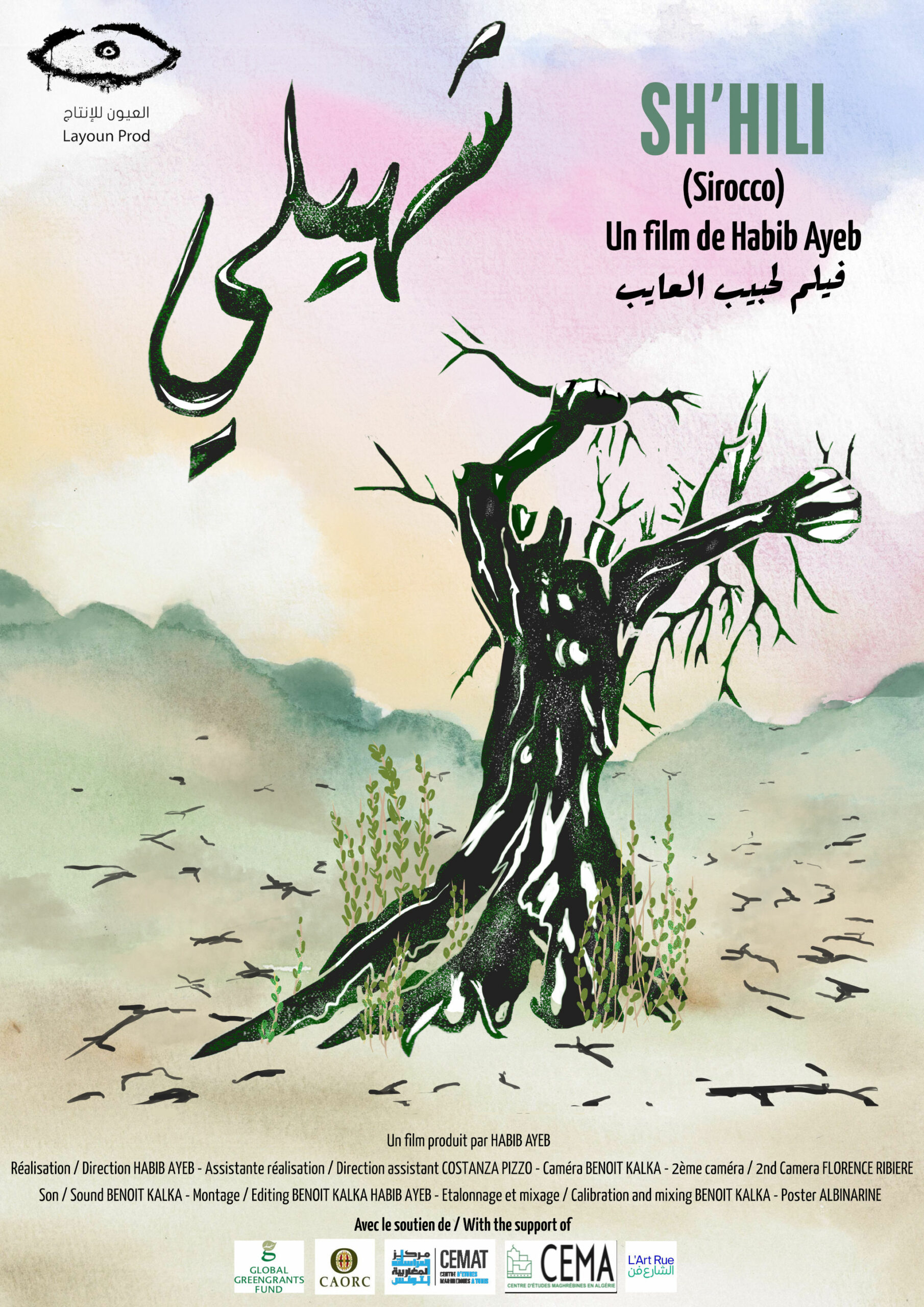Sh’hili (Sirocco)
Fiche technique :
Réalisation : Habib Ayeb
Montage : Benoît Kalka & Habib Ayeb
Images : Benoît Kalka
Assistante réalisation : Costanza Pizzo
Seconde caméra : Florence Ribière
Son : Benoît Kalka
Etalonnage : Benoît Kalka
Mixage : Benoît Kalka
Images drone en Sicile : © Melissa Carnemolla
Images Maroc : © Hicham Idrissi Semlali
Images Interview avec Fadhel Kaboub : © Ernest Riva
Sous-titrages :
Arabe : Chaima Jebali
Anglais : Costanza Pizzo, Laryssa Chomiak, Robert Parks
Italien : Costanza Pizzo
Français : Patrick Goutefangea
Musiques :
Tigrane Kazazian – Joya de l’album Still love
Benoît Kalka – Drum for the nature
التفاصيل الفنية:
Scheda tecnica:
Regia: Habib Ayeb
Montaggio: Benoît Kalka & Habib Ayeb
Immagini: Benoît Kalka
Assistente alla regia: Costanza Pizzo
Seconda camera: Florence Ribière
Suono: Benoît Kalka
Grading: Benoît Kalka
Mixaggio: Benoît Kalka
Immagini drone in Sicilia: © Melissa Carnemolla
Immagini Marocco: © Hicham Idrissi Semlali
Immagini Intervista con Fadhel Kaboub: © Ernest Riva
Sottotitoli:
Arabo : Chaima Jebali
Inglese - Inglese: Costanza Pizzo, Laryssa Chomiak, Robert Parks
Italiano - Italiano: Costanza Pizzo
Francese - Francese: Patrick Goutefangea
Musica:
Tigrane Kazazian – Joya dall'album Still love
Benoît Kalka – Drum for the nature
Technical details:
Direction: Habib Ayeb
Editing: Benoît Kalka & Habib Ayeb
Images: Benoît Kalka
Direction assistant: Costanza Pizzo
Second camera: Florence Ribière
Sound: Benoît Kalka
Colors grading: Benoît Kalka
Mixing: Benoît Kalka
Drone images in Sicily: © Melissa Carnemolla
Images Morocco: © Hicham Idrissi Semlali
Images interview with Fadhel Kaboub: © Ernest Riva
Subtitles:
Arabic: Chaima Jebali
English: Costanza Pizzo, Laryssa Chomiak, Robert Parks
Italian: Costanza Pizzo
French: Patrick Goutefangea
Musics:
Tigrane Kazazian – Joya from the album Still love
Benoît Kalka – Drum for the nature
Synopsis :
Depuis plusieurs décennies, on parle partout des processus de changement climatique et de réchauffement de la planète en cours. Les conférences, les forums et les publications se multiplient. Les fameuses COP (Conférences des Parties) qui se tiennent chaque année dans un pays différent rassemblent des centaines de délégations du monde entier. Et pourtant, peu de résultats, alors que les phénomènes de CC continuent de s'aggraver : hausse accélérée des températures moyennes, événements météorologiques extrêmes, sans parler des pandémies effrayantes et dévastatrices comme le Covid 19, qui a déjà coûté la vie à des millions de personnes en seulement 3 ans.
Il est indiscutable que ces phénomènes de CC accélérés ont commencé et se sont développés dans le Nord avec l'utilisation de plus en plus intensive et massive des combustibles fossiles depuis la "révolution industrielle". Les puissances économiques capitalistes et néocoloniales continuent de produire la quasi-totalité du dioxyde de carbone (CO2) qui est la cause directe du réchauffement climatique.
D’un autre côté, Il est tout autant prouvé que les conséquences les plus dramatiques des CC sont en grande partie enregistrée dans les pays non industrialisés du Sud dont la contribution à la production de carbone est pratiquement nulle. A titre de comparaison, alors qu’en Éthiopie l’émission annuelle de CO2 par habitant était de l’ordre de 0,15 tonne en 2021, elle était de 10,28 en Amérique du Nord, 8,09 en Allemagne et 4,8 en France, la même année. Autrement dit, un Ethiopien produit en moyenne 68 fois moins qu’un nord-américain et 27 fois moins qu’un français. Mais cela n’est qu’un exemple d’injustices climatiques.
Filmé entre la France, l’Italie la Tunisie et le Maroc, Sh’hili essaie d’aborder l’ensemble des questions et dimensions des CC à partir d’un positionnement politique engagé pour la justice climatique, la protection des populations les plus vulnérables, la protection de la vie et la résistance à toutes les formes de dominations et de politiques coloniales et néocoloniales. Ainsi, Sh’hili se veut une contribution, quoique modeste, à la résistance collective au CC et ses conséquences écologiques, humaines et politiques.
:الملخص
منذ عدة عقود حتى الآن، يتحدث الناس في كل مكان عن تغير المناخ وعمليات الاحتباس الحراري الجارية في كل مكان. وتتضاعف المؤتمرات والمنتديات والمنشورات. وتجمع مؤتمرات الأطراف الشهيرة التي تعقد كل عام في بلد مختلف مئات الوفود من جميع أنحاء العالم. ومع ذلك، هناك القليل من النتائج، بينما تستمر ظواهر الاحتباس الحراري في التفاقم: الارتفاع المتسارع في متوسط درجات الحرارة، والظواهر الجوية العنيفة، ناهيك عن الأوبئة المخيفة والمدمرة مثل كوفيد 19، الذي أودى بحياة الملايين من الناس في 3 سنوات فقط.
ومما لا جدال فيه أن ظاهرة الاحتباس الحراري المتسارع هذه بدأت وتطورت في الشمال مع الاستخدام المكثف والهائل المتزايد للوقود الأحفوري منذ "الثورة الصناعية". وتستمر القوى الاقتصادية الرأسمالية والاستعمارية الجديدة في إنتاج مجمل غاز ثاني أكسيد الكربون (CO2) الذي يعد السبب المباشر للاحتباس الحراري.
ومن ناحية أخرى، فقد ثبت أيضًا أن العواقب الأكثر مأساوية لتغير المناخ تسجل إلى حد كبير في بلدان الجنوب غير الصناعية، التي تبلغ مساهمتها في إنتاج الكربون صفرًا تقريبًا. وعلى سبيل المقارنة، في حين بلغ نصيب الفرد من انبعاثات ثاني أكسيد الكربون السنوية في إثيوبيا حوالي 0.15 طن في عام 2021، كان 10.28 في أمريكا الشمالية و8.09 في ألمانيا و4.8 في فرنسا في العام نفسه. وبعبارة أخرى، ينتج الإثيوبي في المتوسط 68 مرة أقل من الفرد في أمريكا الشمالية و27 مرة أقل من الفرد الفرنسي. ولكن هذا مجرد مثال واحد على الظلم المناخي.
يحاول فيلم "شهيلي" الذي تم تصويره بين فرنسا وإيطاليا وتونس والمغرب، معالجة جميع قضايا وأبعاد تغير المناخ من موقف سياسي ملتزم بالعدالة المناخية وحماية الفئات السكانية الأكثر ضعفًا وحماية الحياة ومقاومة جميع أشكال الهيمنة والسياسات الاستعمارية والاستعمارية الجديدة. لذلك فإن الهدف من "شهيلي" هو مساهمة، وإن كانت متواضعة، في المقاومة الجماعية لتغير المناخ وعواقبه البيئية والبشرية والسياسية.
Sinossi:
Da alcuni decenni si parla ovunque dei processi di cambiamento climatico e di riscaldamento globale in corso. Si moltiplicano le conferenze, i forum e le pubblicazioni. Le famose COP (Conferenze delle Parti), che si tengono ogni anno in un Paese diverso, riuniscono centinaia di delegazioni da tutto il mondo. Eppure i risultati sono limitati, mentre i fenomeni di CC continuano a peggiorare: aumento accelerato delle temperature medie, eventi meteorologici estremi, per non parlare di pandemie spaventose e devastanti come la Covid 19, che ha già causato la morte di milioni di persone in soli 3 anni.
È indiscutibile che questi fenomeni di accelerazione del CC siano iniziati e si siano sviluppati nel Nord del mondo con l'uso sempre più intensivo e massiccio di combustibili fossili a partire dalla “rivoluzione industriale”. Le potenze economiche capitaliste e neocoloniali continuano a produrre quasi tutta l'anidride carbonica (CO2) che è la causa diretta del riscaldamento globale.
D'altra parte, è stato anche dimostrato che le conseguenze più drammatiche dei CC si registrano in gran parte nei Paesi non industrializzati del Sud, il cui contributo alla produzione di carbonio è praticamente nullo. A titolo di paragone, se nel 2021 le emissioni annue pro capite di CO2 dell'Etiopia erano di circa 0,15 tonnellate, nello stesso anno erano di 10,28 in Nord America, 8,09 in Germania e 4,8 in Francia. In altre parole, un etiope produce in media 68 volte meno di un nordamericano e 27 volte meno di un francese. Ma questo è solo un esempio di ingiustizia climatica.
Girato tra Francia, Italia, Tunisia e Marocco, Sh'hili cerca di affrontare tutte le questioni e le dimensioni del CC da una posizione politica impegnata per la giustizia climatica, la protezione delle popolazioni più vulnerabili, la tutela della vita e la resistenza a tutte le forme di dominio e politiche coloniali e neocoloniali. Sh'hili vuole quindi essere un contributo, seppur modesto, alla resistenza collettiva ai CC e alle loro conseguenze ecologiche, umane e politiche.
Synopsis:
For several decades now, people have been talking everywhere about the processes of climate change and global warming underway. Conferences, forums and publications are multiplying. The famous COPs (Conferences of the Parties) held each year in a different country bring together hundreds of delegations from all over the world. And yet there are few results, even though CC phenomena continue to worsen: accelerated rises in average temperatures, extreme weather events, not to mention frightening and devastating pandemics such as Covid 19, which has already claimed the lives of millions of people in barely 3 years.
There is indisputable proof that these accelerated CC phenomena began and developed in the North with the increasingly intensive and massive use of fossil fuels since the "industrial revolution". The capitalist and neo-colonial economic powers continue to produce almost all the carbon dioxide (CO2) that is the direct cause of global warming.
On the other hand, it is equally proven that the most dramatic consequences of CC are largely recorded in the non-industrialized countries of the South, whose contribution to carbon production is practically negligible. By way of comparison, while Ethiopia's annual per capita CO2 emissions were around 0.15 tonnes in 2021, they were 10.28 in North America, 8.09 in Germany and 4.8 in France in the same year. In other words, an Ethiopian produces on average 68 times less than a North American and 27 times less than a French person. But this is just one example of climate injustice.
Filmed between France, Italy, Tunisia and Morocco, Sh'hili attempts to address all the issues and dimensions of the CC from a political position committed to climate justice, the protection of the most vulnerable populations, the protection of life and resistance to all forms of colonial and neo-colonial domination and policies. Sh'hili is therefore intended as a contribution, albeit a modest one, to collective resistance to CC and its ecological, human and political consequences.


